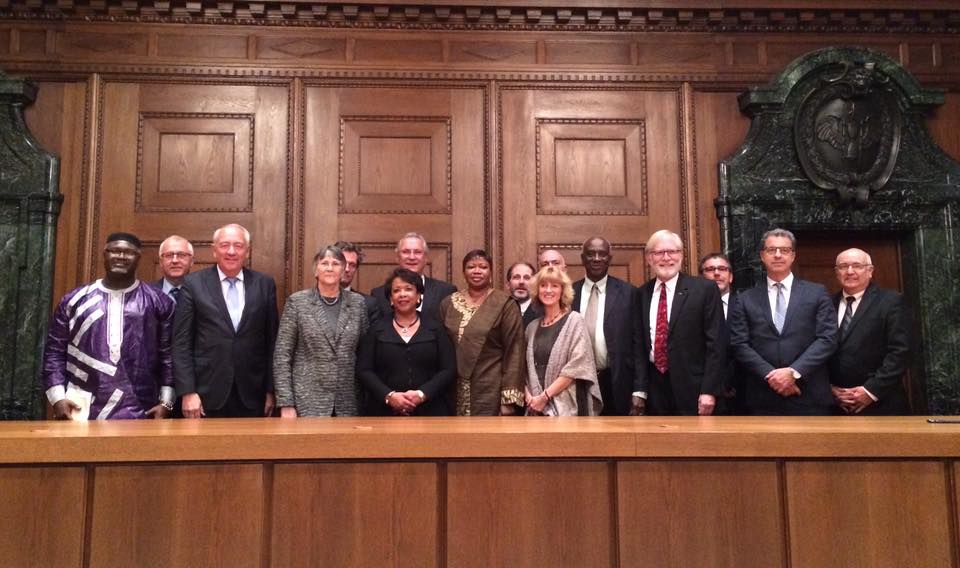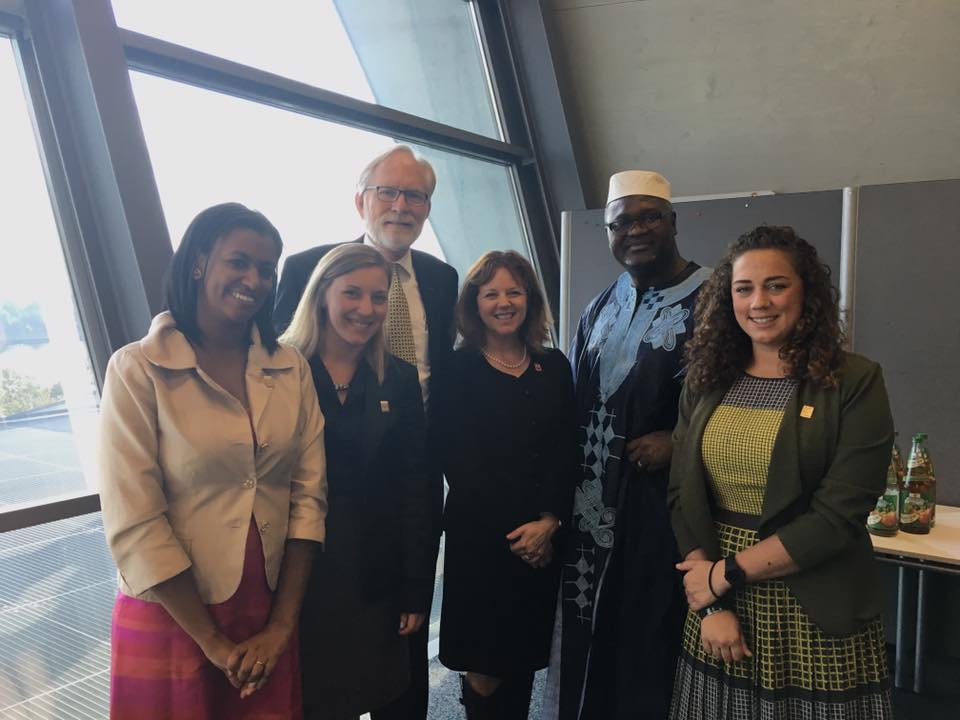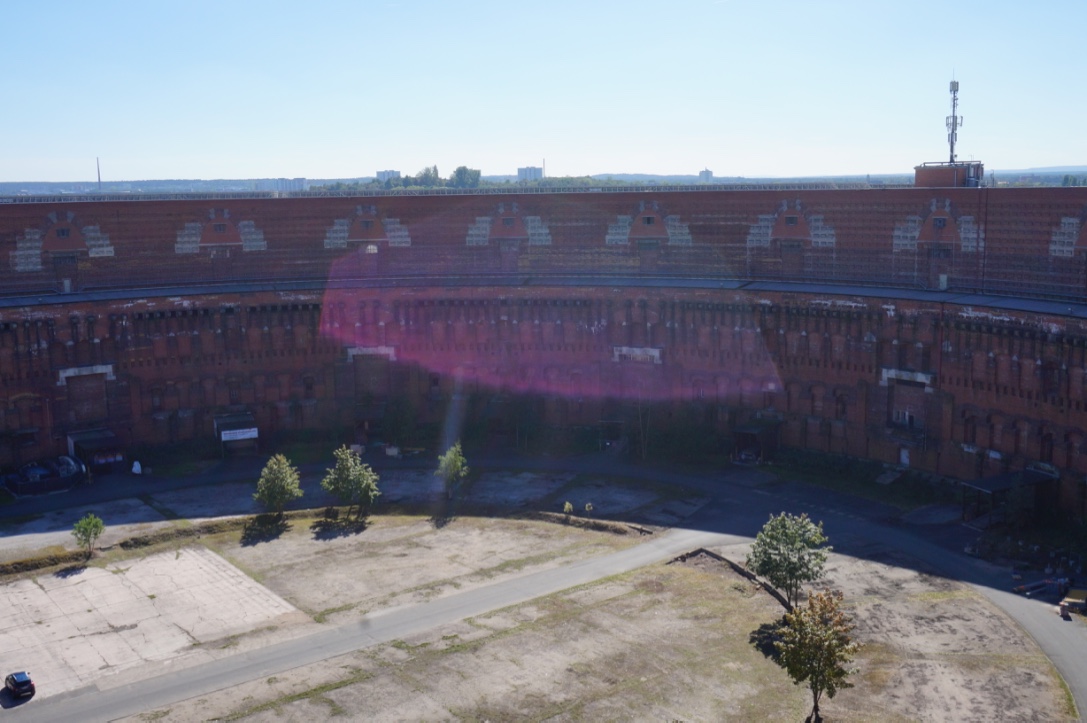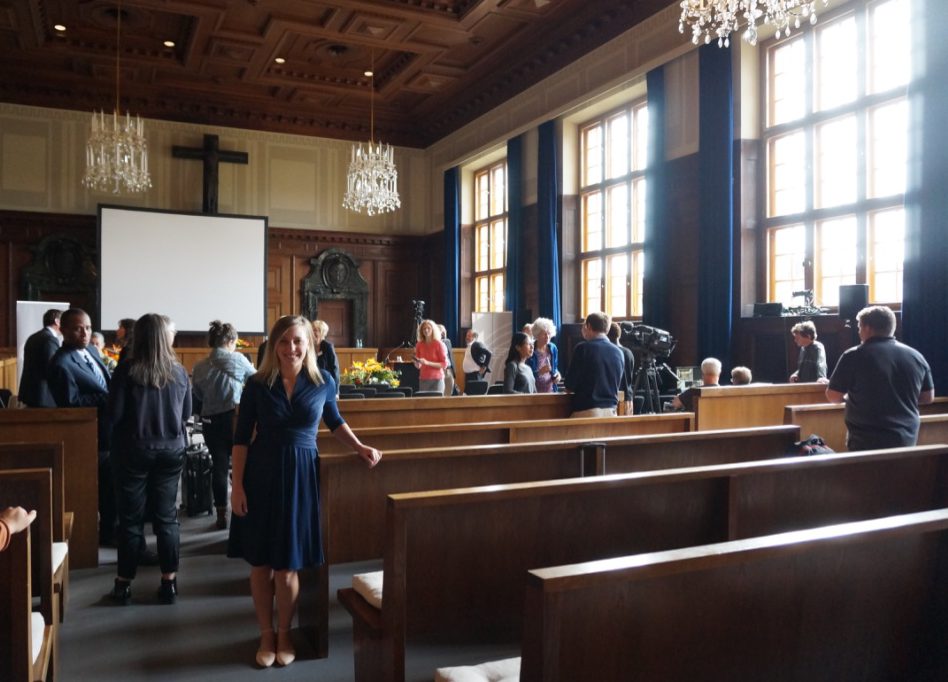“Let us leave here renewed in our devotion to justice – not just for the people of our own countries, but for the people of all countries. Let us leave here refreshed in our determination to defend human rights, to protect human liberty, and to uphold human dignity wherever and whenever it is threatened.”
– Commemoration of the 70th Anniversary of the Nuremberg Trials, U.S. Attorney General Loretta Lynch (Sept. 29, 2016)
By: Kristin Smith
On September 29-30, 2016, the Tenth International Humanitarian Law Dialogs convened in Nuremberg, Germany, a special location chosen to commemorate the 70th anniversary of the Nuremberg trials, where the Allied Powers tried Nazi war criminals for atrocities committed during World War II. The Harris Institute has been a supporter and co-sponsor of the Dialogs, normally convened at the Chautauqua Institution, from their first year onward. The Dialogs gather prosecutors and jurists from across the field, as well as academics and nongovernmental partners, to discuss case progress and issues that extend beyond the walls of their own courts.

Global Prosecutors in Courtroom 600 with U.S. Attorney General Loretta Lynch (center)
The weekend opened with an inspiring ceremony in Courtroom 600, the small, classical courtroom where 22 defendants were tried at the International Military Tribunal at Nuremberg. ICC Chief Prosecutor Fatou Bensouda spoke about the shared responsibility that people and States around the world have to address atrocity crimes, noting that the arc of justice bends towards accountability. U.S. Attorney General Loretta Lynch gave a beautiful, reverent speech about the potential power of fairly-applied justice and the rule of law, stating that by seeking justice rather than vengeance, Nuremberg participants showed that “war does not have to be the final arbiter of human affairs.”
“Certainly the onslaught of evidence of man’s inhumanity to man can leave one dispirited and discouraged. But we cannot – and we should not – give in to despair, because the legacy of Nuremberg is that when we are called to confront the evil that walks this earth, we turn to the law. When we need to mete out justice to those who have reaped the whirlwind and revel in the chaos resulting therefrom, we turn to the law. And through the law we give voice to those shattered souls who seek redress, and we provide a reckoning to those who trade in fear and trembling. Let us never forget that within these walls, evil was held to account and humanity prevailed.”
– Commemoration of the 70th Anniversary of the Nuremberg Trials, U.S. Attorney General Loretta Lynch (Sept. 29, 2016)

from left: Bethel Mandefro, Kristin Smith, former Chief Prosecutor for the SCSL Professor David Crane, Harris Institute Director Leila Sadat, Sierra Leone’s Attorney General and Minister of Justice and former Deputy Prosecutor for the SCSL Joseph Kamara, former Harris Institute Fellow Madaline George
Throughout the weekend, I was reminded often of the issues that make international justice exciting to many of its scholars and practitioners: its relative newness and continual development to fit unique circumstances, the intellectual challenges inherent in operating a justice system respected by those from diverse backgrounds and legal systems, and its essentiality for societies rebuilding after violence or persecution. Dialog participants discussed many of these challenges over the weekend in ways that both asked difficult questions and fostered insightful discussion. Ambassador Hans Corell highlighted the necessity of global cooperation in addressing future atrocities and humanitarian crises, including ensuring that heads of state are held accountable and assisting the future populations that will be displaced by climate change. The Honorable Joseph Kamara (Attorney General of Sierra Leone and former Deputy Prosecutor of the Special Court for Sierra Leone) cited Sierra Leone cases as examples of the intricacies in making prosecutorial decisions on how to charge crimes of sexual violence to accurately capture victims’ experiences, and spoke from experience about the mutually beneficial relationship that national and international courts can have as post-conflict states work to hold perpetrators accountable, create a factual record of atrocities, internalize past events and seek justice on behalf of victims. Many Prosecutors, including Brenda Hollis of the Special Court for Sierra Leone and ICC Chief Prosecutor Fatou Bensouda, noted the need for greater transparency and outreach to ensure that societies understand courts’ mandates, hold realistic expectations of their roles and cooperate with prosecutions.

Part of the former Nazi Party Rally Grounds, former Congress Hall houses the Documentation Centre in its north wing.
The weekend concluded with a forward-looking discussion on transitional justice sponsored by the Nuremberg International Principles Academy. As part of this discussion, Professor Christoph Safferling of the University of Erlangen-Nürnberg explained the complex and at times ambivalent valuation of criminal accountability that Germans held in the shadow of World War II, and how it evolved throughout the twentieth century. After visiting the Documentation Centre and the former Nazi Party Rally Grounds, one can see how the City of Nuremberg has internalized its complicated past as both the site of the Nazi Party’s rise and its legal condemnation. The former Rally Grounds are now a parking lot, race track, and apparently an occasional concert venue (they once hosted a Bob Dylan concert), as people remain divided over how best to balance potential education opportunities with denunciation of the grounds’ initial purpose. As Professor Safferling said, however, we cannot just blow up our history (as was once attempted at the Rally Grounds) and hope it goes away.

Harris Institute Fellow Kristin Smith, in Courtroom 600 of the Nuremberg Palace of Justice.
